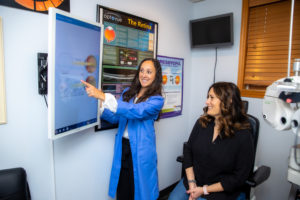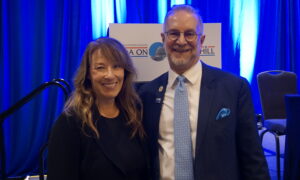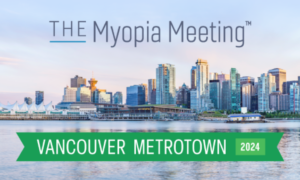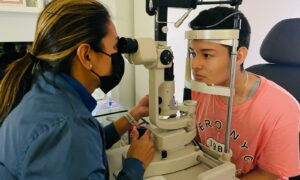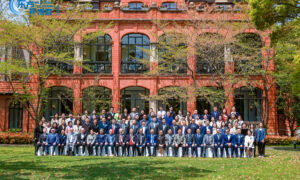June 15, 2022
By Jacqueline Cozzone, OD
It is of the utmost importance to educate patients and their parents about myopia management and specifically that there is something that we can do to help their child’s vision and their long-term eye health. Education is key.
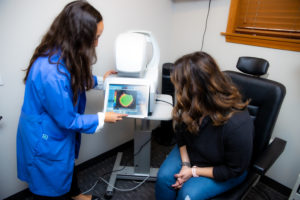
Dr. Cozzone takes her patients’ lifestyles into consideration when creating a myopia treatment plan.
I was first introduced to myopia management during a specialty contact lens course in optometry school. I was the subject in the testing of orthokeratology, so I underwent treatment for an entire year. It wasn’t until I joined Forsight Vision four years ago after graduating from the Illinois College of Optometry that I could put my knowledge to work and manage and fit myopia patients of my own.
Making a Treatment Plan
While it seems that most of the patients I see are candidates for some form of myopia intervention, when it comes to formulating a treatment plan for my myopia patients, it’s on a case-by-case basis. Every patient’s age, maturity, capabilities, willingness, parental support, and financial situation will differ. I tend to favor OrthoK with most of my patients, as this was the first myopia management treatment I had experienced, and I’ve seen the most patient success with it. However, you must ensure that the patient is ready since it is a big commitment — physically, mentally, and financially. We had an experience where we jumped into OrthoK a bit too quickly with a patient who wasn’t ready for it, and the treatment was ultimately unsuccessful, and the experience wasn’t great for the patient. We ended up taking the patient out of OrthoK, postponing treatment for six months with spherical soft contact lenses. The patient became more comfortable with the OrthoK regimen and did much better the second time. This case shows the importance of getting to know your patients and learning what they are and aren’t ready for when they come into the office.
Education is Key
It is of the utmost importance to educate patients and their parents about myopia management and specifically that there is something that we can do to help their child’s vision and their long-term eye health. Education is key. This is just as important for an eye care practitioner as it is for parents and patients. I stay up to date on the latest research, regularly take CE, and adopt new technology as much as possible to always stay at the forefront of myopia management.
When it comes to educating parents, I provide them with all the information at the time of their child’s examination. I never wait to present this information. Most of the time, parents are either already concerned or sense your concern. However, most parents also don’t know we can take active steps to slow myopia progression in their child. It’s comforting to parents to hear me explain the myopia management treatment options and know that there are options for their child. New children and their parents are often shocked at why their old doctor has never mentioned this before. (And they’re glad they made the switch!) Existing patients are reassured with their choice to continue at our practice.
During these conversations with parents, I find it helpful to focus on the eye’s overall health and the effects of an increase in myopia. Higher myopia makes it more challenging to live without affecting your quality of life and puts you at risk for other eye health conditions. We truly believe the eyes deserve this attention and investment.
Utilizing Industry Resources
In addition to utilizing educational and marketing materials from various manufacturers to give to parents and hang in our office, we’ve also started working with Hoot Myopia Care. The owner, Bob Miglani, contacted us as he knew we were a thriving, progressive practice for myopia management, and we were one of the first five offices that started working with Hoot. The idea behind Hoot is genius, and we were very excited to get on board. Having a whole database of information, videos, and research to provide to our patients is vital. It has also helped convert parents who may be on the fence about joining our myopia management program. Everything we talk about in the exam room is reiterated and stressed in these resources. Before working with Hoot, we had discussed making our own videos to share with patients, but this has been much more convenient and successful for us. Being able to send videos directly to patients via email or with a quick QR code scan and offer them this pivotal information at their fingertips makes us stand out from other providers. We’ve found the insertion/removal videos to be particularly helpful with our patients, as sometimes just starting with contacts can be scary, and children may forget what they learn in our training sessions. These videos comfort patients and their parents when starting with lenses for the first time at home.
With all of the available educational resources, I hope that more and more health care professionals get on board with myopia management and educate their patients. This includes optometrists, ophthalmologists, pediatricians, and school nurses. Even if they cannot fit and manage patients themselves, referring them to eye care professionals trained to manage juvenile-onset myopes is a tremendous step forward.
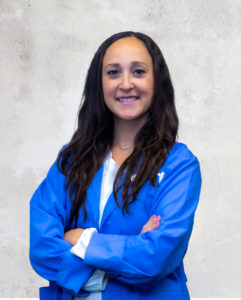 |
Dr. Jacqueline Cozzone is a graduate of Augustana College where she earned her Bachelor of Science degree in Biology and Sociology. She earned her Doctor of Optometry degree from Illinois College of Optometry. Her rotational experience provided her with advanced knowledge in ocular disease and specialty contact lenses. Dr. Cozzone practices full scope optometry helping patients of all ages, with clinical focus on dry eye disease, myopia management, orthokeratology, and scleral contact lenses. She has been practicing at Forsight Vision in Long Grove, IL, for four years. |


